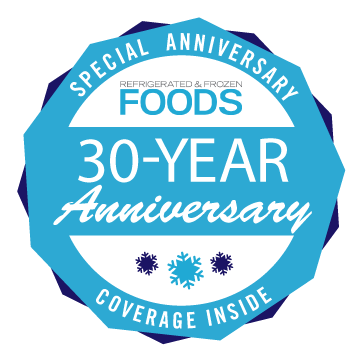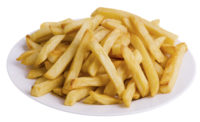Pivoting Potato Pioneers: McCain Foods
Our 30-Year Anniversary coverage wraps up as we catch up with our 2012 Frozen Foods Processor of the Year.

McCain Foods is currently expanding its Othello, Washington, plant by 170,000 square feet (on 11,000 acres), investing $300 million, and will include a new state-of-the-art French fry processing line.
The coronavirus pandemic has forced many cold foods manufacturers and distributors to pivot sharply from foodservice-focused production to retail, due to shutdowns and historic changes in consumer demand. For many of those companies, it’s uncharted territory and an unprecedented shift in business strategy. But for McCain Foods, it’s familiar terrain the company traversed a decade earlier.
Consider this prescient piece from Refrigerated & Frozen Foods’ September 2012 cover story about McCain Foods, when it was named our Frozen Foods Processor of the Year:

“When the recent recession hit, restaurants suffered. In fact, more and more consumers ditched the diners to prepare meals at home. For companies like McCain Foods, with a large foodservice footprint, this meant it had to create demand where demand did not exist,” wrote R&FF’s Editor-in-Chief at the time, Marina Mayer.
Back in 2012, McCain was developing and releasing new retail potato and appetizer products to secure a foothold in the freezer aisle—mainly through its namesake brand and Ore Ida, which it acquired from Heinz in 1997 for $500 million. Today, McCain has firmly established its retail presence in stores nationwide, which allowed the company to focus more on its supply chain and staff safety during the pandemic.

“Like many other food manufacturers, the impact of COVID-19 required a rapid response and flexibility in order to support safety measures for employees and the communities in which we serve, and to meet a change in consumer preference,” says Tarah Arnold, U.S. corporate affairs for McCain Foods. “As grocers struggled to meet an exceptionally high consumer demand, and restaurants were limited to take-out food, manufacturers had to shift priorities. This shift provided us with an opportunity to re-examine our supply chain process—from demand planning through supply chain to the end customer— to ensure that in the future we can continue to evolve and meet consumer needs. While this was an exercise in which we were already actively undertaking, the impact of the pandemic created an even greater sense of urgency for McCain Foods and our potato growing partners.”
Foodservice remains a significant portion of McCain’s business, with its recognizable Anchor, Brew City, Harvest Splendor, Moore’s, and Golden Crisp brands. The focus on take-out and delivery this year for McCain’s clients yielded the company’s SureCrisp French fries, which “are intentionally designed to stay crispy longer so consumers can enjoy that fresh, flavorful crunch they’ve come to associate with McCain Foods French fries,” says Arnold.

McCain Foods manufactures approximately 25% of the world’s French fries.

McCain Foods is committed to becoming a zero-landfill waste company by 2030.
McCain was founded in 1957 by brothers Wallace and Harrison McCain in New Brunswick, Canada, with 30 employees and $152,000 in sales. Today, McCain produces one in every four French fries on the planet, and has grown to 22,000 employees in 160 countries, with $7.6 billion in sales. The company is still family owned, and has its global headquarters in Toronto, with its U.S. headquarters in Oak Brook, Illinois. At the time of our 2012 cover story, McCain had 19,000 staff and 30 potato production sites, generating 150 million pounds of fries in various shapes per week.
In 2016, McCain acquired Great American Snacks, an Idaho-based frozen appetizer company comprised of three brands: Great American Snacks, Wahoo Appetizers, and Pecos Valley Farms, plus private-label and foodservice options. “That pushed McCain Foods further into appetizers, creating products in the onion ring, cheese, jalapeño, vegetable, specialty, and dip categories,” Arnold explains.

McCain’s Othello, Washington, expansion project will bring 180 new jobs to the area, adding to the 450 employees that work there now.

McCain implemented 37 different energy-saving projects at its Burley, Idaho, plant resulting in more than 50 million kilowatt hours saved annually.
Plant Progress and Sustainability
McCain is currently expanding its Othello, Washington, plant by 170,000 square feet (on 11,000 acres), investing $300 million, and will include a new state-of-the-art French fry processing line. The expansion will also bring 180 new jobs to the area, adding to the existing 450 that work there now producing 400 million pounds of frozen potato products annually.
Packaging has been another focus for the company since 2012, improving consumer-friendly features on retail foods with easy-open options and stand-up pouches with greater shelf appeal. From a sustainability standpoint, the company has made a number of changes, including a switch to lighter weight plastic films; a move toward eliminating laminated packaging; phasing out non-recyclable materials; using 100% sustainably sourced materials; and streamlining packages to remove unnecessary material, weight, headspace, and adding flap gaps.
In 2020, McCain commissioned a Corporate Social Responsibility (CSR) Report, committing to becoming a zero-landfill waste company using 100% renewable energy, and reducing CO2 emissions by 50% in 2030. At McCain’s Burley, Idaho, plant, 37 different energy-saving projects have already resulted in more than 50 million kilowatt hours saved annually.

Potato products are still the foundation of McCain’s business, but the company has branched out into appetizers with onions, cheese, jalapeños, vegetables and other ingredients since our 2012 cover story.
Also part of that CSR Report was a focus on thriving communities through outreach and charity work. The company has been busy this year partnering with No Kid Hungry, since school foodservice is a sizeable portion of McCain’s business. “In 2020 we saw widespread closures of schools nationwide. For many children who rely on schools for their meals, this created greater food insecurity,” Arnold says.
Looking ahead to 2021 and beyond, McCain Foods plans to continue and expand its sustainability and community initiatives, while keeping its evolving portfolio of products diversified for multiple markets, ensuring it can maneuver nimbly regardless of the economic climate or changing consumer preferences.
Looking for a reprint of this article?
From high-res PDFs to custom plaques, order your copy today!






